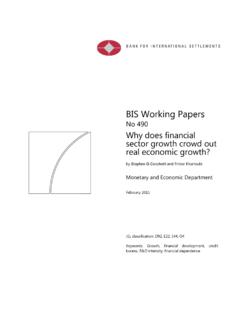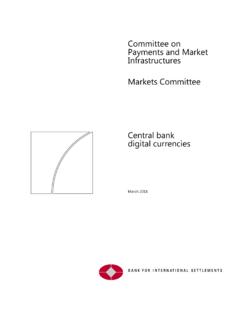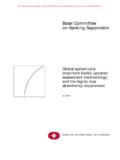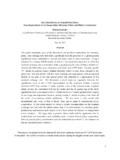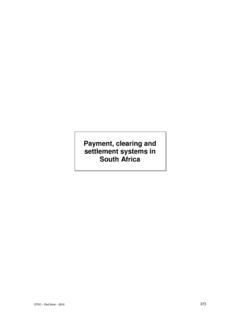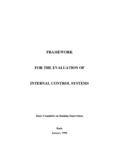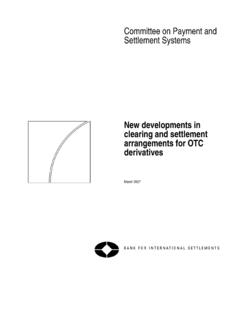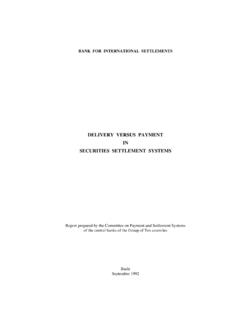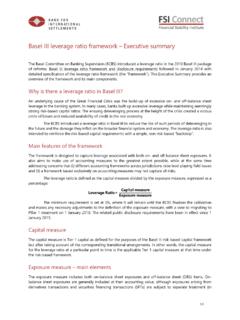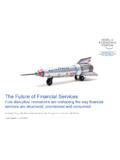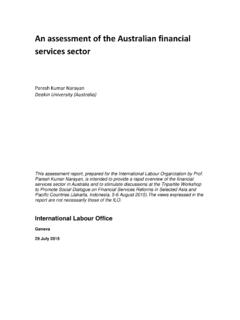Transcription of The transformation of the financial services industry
1 financial Stability Institute Occasional Paper No 2. The transformation of the financial services industry H Onno Ruding, Vice-Chairman, Citibank March 2002. The views expressed in this paper are those of their author and not necessarily the views of the financial Stability Institute or the Bank for International Settlements. Copies of publications are available from: financial Stability Institute Bank for International Settlements CH-4002 Basel, Switzerland E-mail: Tel: +41 61 280 9989. Fax: +41 61 280 9100 and +41 61 280 8100. This publication is available on the BIS website ( ). financial Stability Institute 2002.
2 Bank for International Settlements. All rights reserved. Brief excerpts may be reproduced or translated provided the source is cited. ISSN 1020-8461. Foreword It is a pleasure for me to introduce the second occasional paper published by the financial Stability Institute. Apart from creating an awareness of, and providing information on, topics of interest to financial sector supervisors, these papers are also intended to provide food for thought on issues currently driving change in the financial sector. In many cases supervisors will be required to respond to these changes, often in ways that have far-reaching implications for financial markets.
3 The financial Stability Institute believes that Dr H Onno Ruding, currently Vice-Chairman of the Citibank Group and formerly the Minister of Finance of The Netherlands, is ideally placed to provide a balanced view on the topic of the transformation of the financial services industry . He has been exposed to the workings and vagaries of financial markets from both the public and private sectors. This paper is based on a speech given by Dr Ruding at a conference on deposit insurance held at the Bank for International Settlements in November 2001. The paper explores consolidation in the financial services industry and provides valuable insights on the forces driving consolidation and the implications for both financial institutions and supervisors.
4 The paper also sets out minimum requirements for an effective safety net and provides thoughts on how the resulting moral hazard can be mitigated. Finally, the author examines the issue of regulatory and supervisory policies and the effect they can have on the competitiveness of participants in financial markets. The issues raised in this paper are, we believe, both topical and relevant to financial supervisors, not only in developed countries but also in emerging markets. Josef To ovsk . Chairman financial Stability Institute March 2002. i H Onno Ruding was born in The Netherlands in 1939. He holds a PhD cum laude in Economics from Erasmus University in Rotterdam (1969).
5 After a career at The Netherlands Ministry of Finance, as an Executive Director of the International Monetary Fund in Washington, DC and a member of the Board of Managing Directors of AMRO Bank in Amsterdam, he served as Minister of Finance of The Netherlands from November 1982 to November 1989. In that capacity he was Chairman of the Interim Committee of the IMF. From 1990-92 Dr Ruding was Chairman of the Netherlands Christian Federation of Employers (NCW). In that capacity, he served as a member of the Council of Presidents of UNICE, Brussels. During this time, he chaired the Committee of Independent Experts on Company Taxation, whose 1992.
6 Report was prepared at the request of the European Commission. Dr Ruding became a non-executive Director of Citicorp/Citibank in 1990 and has been a full-time executive since 1992. Since the merger of Citicorp and Travelers into Citigroup in 1998, he has devoted a large part of his time to promoting the growth of Citigroup (Citibank and Schroder Salomon Smith Barney) in Europe. He relocated his main office from New York to Brussels in 2000. Dr Ruding is a non-executive Director of Corning, Pechiney, Unilever and RTL Group. He serves as the Chairman of CEPS. (Center for European Policy Studies), of UNIAPAC and of the Advisory Council of AIF (Amsterdam Institute of Finance).
7 He is also a member of the Trilateral Commission, the International Advisory Committee of the Federal Reserve Bank of New York, the European Advisory Board of AECA, the Board of The Netherlands-American Chamber of Commerce and the International Advisory Boards of Robeco and the Federation of Korean Industries. ii Table of Contents Introduction ..1. The trend towards consolidation in banking ..1. Cross-category consolidation ..6. Cross-border financial safety nets ..14. Regulatory Conclusion ..22. iii iv Introduction The 1990s and the beginning of the new millennium have seen enormous changes in the financial services industry .
8 The impact of, amongst other things, information technology, deregulation and liberalisation has changed and reshaped the financial landscape forever. Going forward, it is probable that this pace of change will continue. This paper discusses some of the more important aspects currently driving change in the financial services industry and considers several of the implications of these changes. Firstly, the current trend towards consolidation in the financial services industry is discussed. In particular, the shift towards cross-category and cross-border consolidation is emphasised. Secondly, the recent financial crises in several regions have highlighted the need for effective financial safety nets.
9 The required components of an effective financial safety net are considered, together with the related potential for moral hazard and how it can, to some extent, be mitigated. Thirdly, the paper examines the issue of differing national supervisory and regulatory policies and how this can impact on the structure and competitiveness of the financial services industries in different countries. The trend towards consolidation in banking1. Perhaps the single most important factor transforming the financial services industry at this time is consolidation. There are several valid motives for bank consolidation by way of 1.
10 See also Group of Ten, Consolidation in the financial sector, Report by a Working Party chaired by Roger W Ferguson Jr, January 2001. 1. mergers or acquisitions. One motive is the need for a large capital base. Capital is much more relevant to the business of banking than to growing potatoes. A large capital base serves as a buffer to absorb losses and, therefore, provides the institution with credibility and its customers with confidence in the institution. The benefit of a large capital base is clear in the case of Barings, which could not absorb a loss of 1 billion and was forced to terminate its life as an independent institution.
